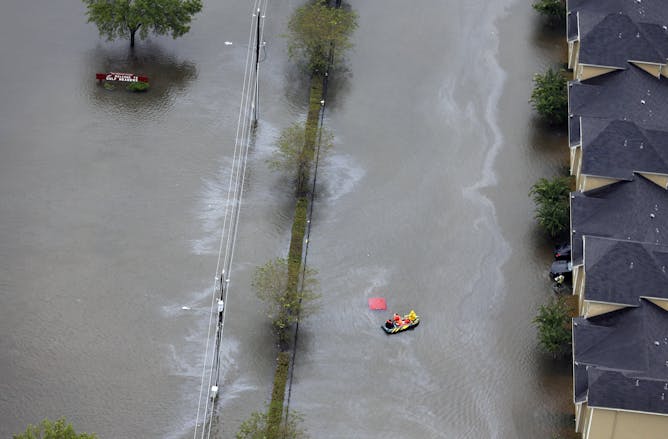Editor's note
|
|
If American society today seems increasingly polarized and extreme, it could be because of how many people use social media, writes Robert Kozinets at the University of Southern California’s Annenberg School for Communication and Journalism. The creator of the discipline of “netnography,” Kozinets says that it’s a sense of competition that drives online posting to extremes – whether it’s uploading a photo of a bigger hamburger than a friend just did, or taking a more passionate political stance.
For the past 12 days, President Donald Trump has been on a charm offensive through Asia. One foreign leader Trump wooed was the Philippine’s Rodrigo Duterte – a man who cursed at Barack Obama and threatened to break up with America. Jessica Trisko Darden of American University explains why a warmer relationship may be beneficial to the U.S. – and highlights the one key topic the leaders seem to have left undiscussed.
The city of Houston has suffered three 500-year storms in the past three years, including Hurricane Harvey. As climate change makes the potential damage from storms ever greater, three scholars of urban resilience argue that cities need to update their information systems to prepare for extreme weather.
|
Jeff Inglis
Science + Technology Editor
|

|
|
Top stories
|

Passionate feelings can lead to extreme divisions.
pathdoc/Shutterstock.com
Robert Kozinets, University of Southern California
The way people use social media – and the algorithms inside those systems – increases passions, and drives people to polarizing extremes.
|

Donald Trump’s and Rodrigo Duterte’s mutual admiration could bring about a thaw in U.S.-Philippine relations.
Reuters/Athit Perawongmetha
Jessica Trisko Darden, American University School of International Service
When Obama was president, Philippine President Rodrigo Duterte threatened to break up with America. Is it time to make up?
|

The intensity of heavy downpours in Houston has increased dramatically since the 1950s, leading some people to argue the city’s disaster planning and infrastructure are not up-to-date.
AP Photo/David J. Phillip
Clark Miller, Arizona State University; Thaddeus R. Miller, Arizona State University; Tischa Muñoz-Erickson, International Institute of Tropical Forestry
It's not just about rebuilding infrastructure after storms: Cities need to systematically rethink their knowledge systems which are at the heart of urban resilience.
|
|
|
|
|
|
|
|
|
Environment + Energy
|
-
Pep Canadell, CSIRO; Corinne Le Quéré, University of East Anglia; Glen Peters, Center for International Climate and Environment Research - Oslo; Robbie Andrew, Center for International Climate and Environment Research - Oslo; Rob Jackson, Stanford University; Vanessa Haverd, CSIRO
After three years in which global carbon emissions scarcely rose, 2017 has seen them climb by 2%, as the long-anticipated peak in global emissions remains elusive.
|
|
|
|
From our international editions
|
-
Craig Bailie, Stellenbosch University
The deaths of four American soldiers in Niger last month highlighted the nature and implications of US military presence in Africa.
-
David Burton, Dalhousie University
The Paris climate agreement aims to limit global warming to 2C above pre-industrial levels. We need to curb greenhouse gas emissions, but we can also make gains with carbon farming.
-
Stephen Harding, University of Nottingham
Remembering J. M. Creeth, 70 years after he discovered hydrogen bonds in DNA.
|
|
|
|
| |
| |
|
|